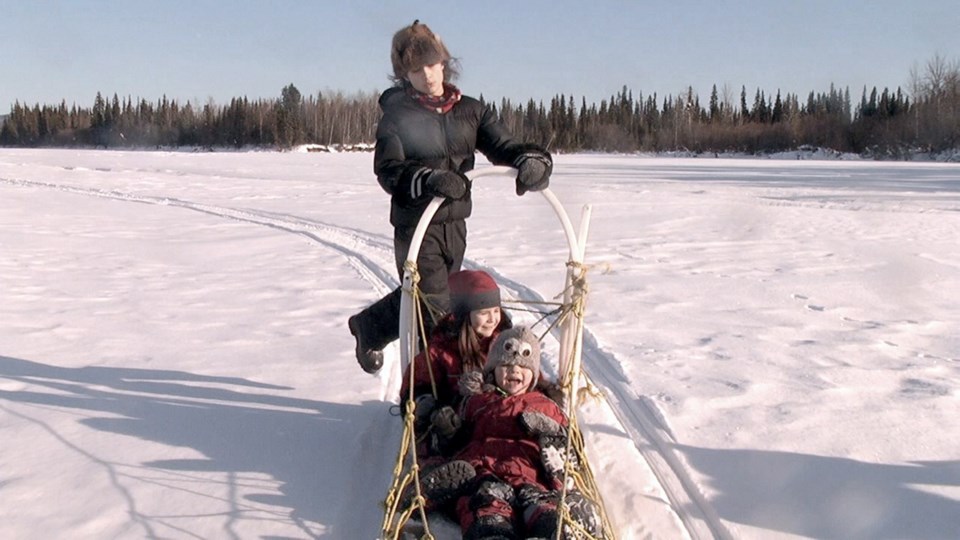Ah, the irony of it all. It began in 2010, when Suzanne Crocker found herself packing a video camera to document her family living “off the grid” in a log cabin with no running water or electricity in the Yukon wilderness for nine months.
As well-intentioned as the Dawson City filmmaker was, she was also acutely aware of the irony of using a high-tech camera to record a low-tech life. But the curiosity of family and friends demanded it.
A year after her documentary All The Time in the World premièred at Vancouver International Film Festival, the ironies are mounting for Crocker as she continues to showcase it globally.
“I’ve just seen my first Tasmanian Devil!” exclaimed Crocker when reached in Tasmania, where her documentary screens tonight, following last Sunday’s screening in Melbourne, Australia.
The screenings Down Under, including another in Sydney Sept. 19, are part of a worldwide tour for the crowd-pleaser, which has taken on a life of its own since it won the Audience Favourite Award at the Victoria Film Festival here last February.
Crocker will participate via Skype from Australia during the film’s return engagement at Movie Monday on Sept. 14, 6:30 p.m. at the Eric Martin Pavilion Theatre.
Other North American screenings of her film, which has won 16 awards, including eight audience favourites, include showcases at Toronto’s Hot Docs and Vancouver’s Reel 2 Real.
It has also been screened in Chile, Mexico, Spain, Estonia and South Africa, including several youth film festivals, notably Italy’s Giffoni International Film Festival.
“It’s back-to-basics, living the simple life,” jokes the retired country doctor, who’s all too aware how surreal her lifestyle has become.
Audiences worldwide have embraced the film, which beautifully chronicles the liberating “simple life” that she and her husband, Gerard Parsons, also a rural physician, their three children — two young girls and an older boy — and their pets experienced during an adventure free of clocks, deadlines and technology many of us think we can’t live without.
“The response has been an amazing experience,” says Crocker, whose favourite moments include three sold-out screenings at Hot Docs, and being interviewed by Anna Maria Tremonti on CBC Radio’s The Current. “But, really, the best rewards of all are when someone in the audience is inspired by the film.”
While Crocker has attended some festivals, mostly on her own as director and producer, her busy life has forced her to be selective.
“I’ve loved having the opportunity to visit different countries with the film as well as different parts of Canada and the U.S., visiting many places I’m not sure I would ever have made it to,” she said.
Indeed, chances are she would never have seen a Tasmanian devil in the Australian island state otherwise, or a wombat or kangaroo for the first time.
The downside of travelling alone is that she misses her family, so when they get to go together, as they did in Italy, South Africa and Cinema Planeta in Mexico, it’s a treat.
She said it surprised her that the documentary resonated so well with “audiences outside of North American culture” and how much positive response it gets from teenagers and young adults.
“The questions from the audience and the comments are surprisingly similar, no matter where in the world it is screening,” she said. “Somehow, a yearning for a simpler life and more time with loved ones and a realization of the importance of spending real face-to-face time with each other — these things seem to be universal.”
The family discovered that when they moved to Victoria the year after living in the bush. Moving to the city proved a tough transition, however, and they returned to Dawson City last year.
While Crocker hasn’t yet tired of visiting new places and showing the film to new audiences, her children have had their fill of travelling for now.
“They really just want to be hanging out at home in Dawson City,” she said, noting that while they have shone during the Q&A sessions, they “have no desire to be in the limelight” and value their free time.
There are still no cellphones in their family, Crocker still doesn’t wear a watch and her children still have no trouble entertaining themselves without technology, as they did during their wilderness sojourn, she said.
The jet-setting filmmaker says the family hasn’t lost its passion for reliving their back-to-nature experience.
“Before leaving for Australia, we were back [at the cabin] in the bush for a blissful technology-free week,” she said. “I could have stayed.”
There’s more work to be done, however, including a film about the health and social impact of technology that she’s developing.
Which brings us to another irony Crocker says is not lost on her family — that their film’s success means she’s spending too much time sitting in front of her computer, a situation she’s determined to rectify.
As Gerard says in the film: “Life is full of contradictions. Sometimes you just have to roll with the contradictions.”



